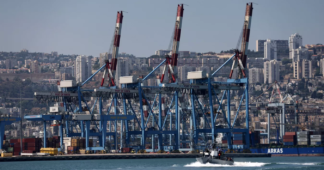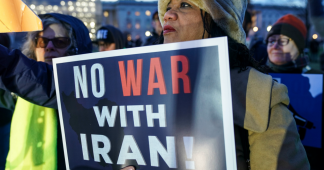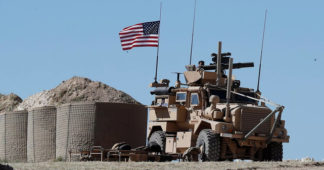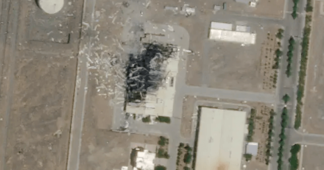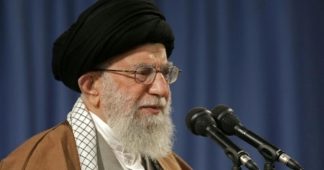Gulf monarchies question US basing agreements as they brace for Iranian retaliation against Israel
By Sean Mathews
12 April 2024
Gulf monarchies are urging the US not to use American military bases on their territories to strike in response to any potential Iranian attack on Israel, sources told Middle East Eye.
The US’s Gulf allies are working overtime to shut down avenues that could link them to a US reprisal against Tehran or its proxies from bases inside their kingdoms, according to a senior US official who spoke with MEE on condition of anonymity.
As tensions flare, Saudi Arabia, the UAE, Oman and Kuwait have raised questions about the intricate details of basing agreements that permit tens of thousands of US troops to be stationed across the oil-rich peninsula.
They are also moving to prevent US warplanes from flying over their airspace in the event the US conducts a retaliatory strike on Iran.
The US has spent decades investing in military bases in the Gulf. Given their close proximity to Iran, those airbases would be the most convenient launching pads for the US against the Islamic Republic, current and former US officials tell MEE.
The Gulf monarchies’ reluctance is complicating the Biden administration’s preparation as it war games how to respond to a potential Iranian attack on Israel. Current and former US officials told MEE they believe an attack is imminent, as has been previously reported elsewhere.
“It’s a mess,” a senior US official told MEE.
National Security Council divided
The official, along with two former senior US officials, who spoke with MEE, outlined three scenarios the White House is planning for Iran’s expected retaliation for a strike on its consulate in Damascus, Syria, earlier this month that was blamed on Israel.
Iran could strike Israel directly from its territory. A second option would be a coordinated attack by Iran’s proxies on Israel, using Shia paramilitaries in Iraq, Yemen’s Houthis, and Lebanon’s Hezbollah – the latter being the most powerful proxy tool in Iran’s arsenal.
A third option could combine the two. The Houthis struggled to breach Israel’s US-supplied Iron Dome defence system immediately after 7 October, but the Biden administration is concerned a multi-faceted attack could overwhelm those defences.
Iran could also strike Israeli embassies – including those in the Middle East – or Israeli troops in the occupied West Bank and Gaza.
US President Joe Biden said he informed Israeli Prime Minister Benjamin Netanyahu that the US’s commitment to Israel’s security was “ironclad”.
But the Biden administration is divided over what level of support to give Israel, current and former US officials told MEE.
The president’s highest-ranking national security officials have staked out different positions, with some like Maher Bitar, the director of intelligence at the National Security Council, urging restraint while Brett McGurk, Biden’s top Middle East envoy, is advocating for a tougher response, sources tell MEE.
The Biden administration’s fear of becoming embroiled in a wider Middle East war ahead of US elections is also weighing on those discussions.
The Gulf states’ cold feet amid the crisis comes after years of complaining that the US has not done enough to protect them from attacks by Iran’s proxies, particularly the UAE and Saudi Arabia. Riyadh and Abu Dhabi viewed the Biden administration’s response to Houthi drone and missile attacks as tepid, and have moved to patch up ties with Tehran.
Gulf leaders are now walking a tightrope between their US ally, Iran, and their populations, who are seething with anger at Israel over its offensive on Gaza that has killed more then 33,000 Palestinians, mainly women and children.
The White House did not respond to Middle East Eye’s request for comment by the time of publication.
US bases in the Gulf states
The US has at least 40,000 troops in the Middle East. The majority are located in the oil-rich Gulf states, where they are based at a string of strategic air and naval bases.
Saudi Arabia’s Prince Sultan Airbase is home to the US’s 378th Air Expeditionary Wing which operates F-16 and F-35 jet fighters. The US operates MQ-9 Reaper drones and jet fighters out of the UAE’s Al Dhafra Air Base. Kuwait’s Ali al-Salem Air Base is home to the 386th Air Expeditionary Wing.
Qatar’s Al Udeid Air Base hosts the regional headquarters for US Central Command. It has also hosted some Israeli military officials, MEE has previously reported, but it’s not clear if those officials are still in the country.
The island kingdom of Bahrain is home to around 9,000 US troops who belong to the headquarters of the US Naval Forces Central Command and the US Fifth Fleet.
Oman also allows the US military overflights and port calls.
Politico reported in February that the UAE was restricting the US’s ability to launch retaliatory strikes against Iran’s proxies from its air bases. The warnings MEE is reporting are new. They underscore the seriousness with which Gulf countries expect the US to retaliate against an expected Iranian strike on Israel and frustration with Washington.
The Middle East has been on alert since the Hamas-led 7 October attacks on southern Israel killed around 1,200 people. Israel responded by launching a ferocious offensive on the Gaza Strip.
The immediate spark putting the region on the brink of a wider war was a strike blamed on Israel on Iran’s consulate in Damascus that killed several top commanders in Iran’s Revolutionary Guard Corps, including General Mohammad Reza Zahedi, the head of IRGC operations in Syria and Lebanon.
The Damascus consulate attack followed months of other strikes on IRGC assets in Syria, Hezbollah commanders in Lebanon, and Hamas officials in the heart of Beirut. Analysts and diplomats say those strikes have taken a toll on Tehran’s power projection and deterrence.
They say Tehran may feel compelled to forcefully retaliate to restore its standing. On Wednesday, Supreme Leader Ayatollah Ali Khamenei said that Israel “must be punished” for the consulate attack, which he equated to a strike on Iranian “soil”.
Middle East Eye reported on Friday that many in Iran are fearful that the war in Gaza will reach Iran, and though many Iranian officials have spoken of retaliation, there has been no confirmation as of yet.
News about the tensions between Israel and Iran over the Gaza war is barely making people’s screens. Instead, weather reports and Eid celebrations are being prioritised.
Western countries have told their citizens in the region to be on high alert. Israel has indicated that it will strike back if Iran does attack.
Also read
From Moscow to Damascus: The art of provocation
We remind our readers that publication of articles on our site does not mean that we agree with what is written. Our policy is to publish anything which we consider of interest, so as to assist our readers in forming their opinions. Sometimes we even publish articles with which we totally disagree, since we believe it is important for our readers to be informed on as wide a spectrum of views as possible.

